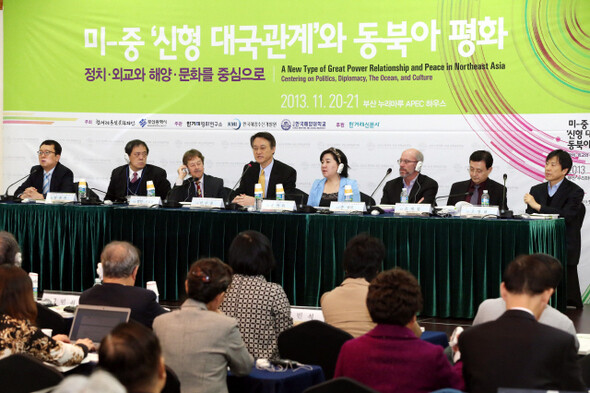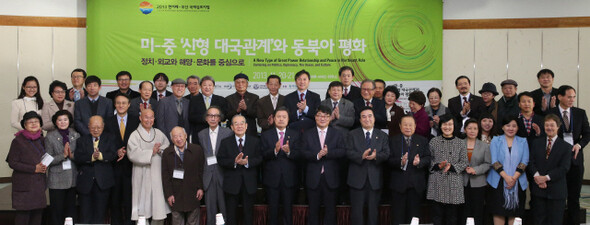hankyoreh
Links to other country sites 다른 나라 사이트 링크
The 9th Hankyoreh-Busan International Symposium’s first day of discussion

By Choi Hyun-june, staff reporter in Busan
The 9th Hankyoreh-Busan International Symposium opened on Nov. 20 at Nurimaru APEC House in Busan’s Haeundae district. The topic of the two-day event this year was “the new type of US/China great power relationship and peace in Northeast Asia.”
Participants argued that a relationship of stable cooperation was the only way to bring peace to the region.
The symposium was attended by some 30 professors and researchers from South Korea, the US, China, and Japan. The focus of the presentations and discussions was on how to forge peace in Northeast Asia at a time when the emerging great power China is demanding a “new type of great power relationship” with the established superpower of the US.
The “new type of great power relationship” is an idea expressed by Chinese President Xi Jinping during a US visit last year, holding that the two sides should pursue shared development through peace and cooperation while avoiding encroaching on each other’s key interests.
Former South Korean Unification Minister Lim Dong-won, who heads the Hankyoreh Foundation for Reunification and Culture, said the conception was “ushering in major political and diplomatic changes” in Northeast Asia and throughout the world.
“China’s changing policies toward North Korea are a key variable affecting the future of the Korean Peninsula,” Lim added. “We are going to have to focus closely on the ‘new type of great power relationship’ in our discussions.”
Melvin Gurtov, a professor at Portland State University in the US, noted that the two sides differ considerably in their views on the Middle East, Iran, and North Korea, as well as environment and energy issues.
“If they can’t agree on what it means to be a ‘responsible power,’ it is difficult to imagine a new US-China relationship developing,” Gurtov said.
Scholars from the US, China, and South Korea had a heated debate on the topic of a new type of great power relationship and what it means. Presenters and discussants from China confidently asserted the “inevitability” of China standing shoulder-to-shoulder with the US, while participants from the US argued that such conclusions are premature. South Korean participants acknowledged the change in the global order and insisted on the need for a “strategic stance” from South Korea.
As the dispute suggests, the idea of a new type of great power relationship is not yet formulated in academic, political, or diplomatic terms. Xi first discussed the topic during a visit to Washington, DC in February 2012, when he was still vice president. The message to the Barack Obama administration, which had declared its own “pivot to Asia,” was that the two sides should adopt an approach of mutual respect for each other’s key interests, without clashing or resistance. Analysts read it as saying that Beijing plans to continue acknowledging the US’s status as a global power and is asking that its own interests be respected.
In a June editorial, the People’s Daily of China wrote that the new type of relationship was “an unprecedented path.”
“Historically, the confrontation and conflict between emerging powers and established powers results in too much bloodshed and brutality,” it wrote.
“Responsibility for overcoming the arguments over old history of resistance and clashes between emerging and established powers now falls on two countries, China and the United States,” it continued.
Catholic University of Korea professor Kim Jae-chul, one of the symposium discussants on Nov. 20, said the idea heralds serious structural changes, in that Beijing is taking the initiative in proposing a new framework for relations with Washington.
“It is significant because China is saying that it does not plan to pose a challenge to the current US-led order, but it’s also adding the conditions that its own key interests be met,” Kim explained.
Teng Jianqun, a China of Institute of International Studies researcher who presented at the symposium, offered the example of Beijing’s reaction to the idea of a “Group of Two” (G2) including the US and China.
“The US and other Western countries first started using the term ‘G2’ about ten years ago, but Hu Jintao and the other past Chinese leaders did not accept it,” Teng explained. “They thought it was still too soon. But the Xi Jinping administration that took office last year was more than willing to accept it. It is that kind of thinking that expresses the ‘new type of great power relationship.’”
Teng also said the two countries should work on building their own ties while checking attempts by other countries to take advantage of any frictions between them. “In that sense, we need less a ‘G2’ framework than a ‘C2’ one, where the ‘C’ stands for ‘cooperation’ and ‘coordination,’” Teng added.
Gurtov was more somewhat cautious. “It is still too early to say anything about a new type of great power relationship,” he argued. “The official US policy on China is still a mixture of competition, cooperation, and containment.”
At the same time, he also observed, “The US doesn‘t have the resources for a continued conflict with China, and vice versa. Both countries need to cooperate and work toward a friendly relationship.”
The argument is that the US is obliged to recognize China, which has become the single largest holder of US bonds and a linchpin for the global economy.
Speaking from the South Korean perspective, Pusan National University professor Cha Chang-hoon said the Asia-Pacific Region would ultimately be the test of the new type of relationship, arguing that South Korea is obliged to watch the developing US-China dynamics closely as a close economic partner of China and a military and diplomatic ally of the US that faces an adversary in North Korea.
“If the US and China can’t form a cooperative relationship at a time when there are so many issues at play in Northeast Asia - North Korea’s nuclear program, territorial disputes, Japan’s rightward shift - then things are definitely going to be very rough from our standpoint,” Cha said.

Please direct questions or comments to [english@hani.co.kr]

Editorial・opinion
![[Column] Park Geun-hye déjà vu in Yoon Suk-yeol [Column] Park Geun-hye déjà vu in Yoon Suk-yeol](https://flexible.img.hani.co.kr/flexible/normal/500/300/imgdb/original/2024/0424/651713945113788.jpg) [Column] Park Geun-hye déjà vu in Yoon Suk-yeol
[Column] Park Geun-hye déjà vu in Yoon Suk-yeol![[Editorial] New weight of N. Korea’s nuclear threats makes dialogue all the more urgent [Editorial] New weight of N. Korea’s nuclear threats makes dialogue all the more urgent](https://flexible.img.hani.co.kr/flexible/normal/500/300/imgdb/original/2024/0424/7317139454662664.jpg) [Editorial] New weight of N. Korea’s nuclear threats makes dialogue all the more urgent
[Editorial] New weight of N. Korea’s nuclear threats makes dialogue all the more urgent- [Guest essay] The real reason Korea’s new right wants to dub Rhee a founding father
- [Column] ‘Choson’: Is it time we start referring to N. Korea in its own terms?
- [Editorial] Japan’s rewriting of history with Korea has gone too far
- [Column] The president’s questionable capacity for dialogue
- [Column] Are chaebol firms just pizza pies for families to divvy up as they please?
- [Column] Has Korea, too, crossed the Rubicon on China?
- [Correspondent’s column] In Japan’s alliance with US, echoes of its past alliances with UK
- [Editorial] Does Yoon think the Korean public is wrong?
Most viewed articles
- 1‘We must say no’: Seoul defense chief on Korean, USFK involvement in hypothetical Taiwan crisis
- 2N. Korean delegation’s trip to Iran shows how Pyongyang is leveraging ties with Moscow
- 3‘Weddingflation’ breaks the bank for Korean couples-to-be
- 4[Reportage] On US campuses, student risk arrest as they call for divestment from Israel
- 5Amnesty notes ‘erosion’ of freedom of expression in Korea in annual human rights report
- 6[Column] Park Geun-hye déjà vu in Yoon Suk-yeol
- 7Korea sees more deaths than births for 52nd consecutive month in February
- 8[Editorial] New weight of N. Korea’s nuclear threats makes dialogue all the more urgent
- 9Will NewJeans end up collateral damage in internal feud at K-pop juggernaut Hybe?
- 10[Guest essay] The real reason Korea’s new right wants to dub Rhee a founding father